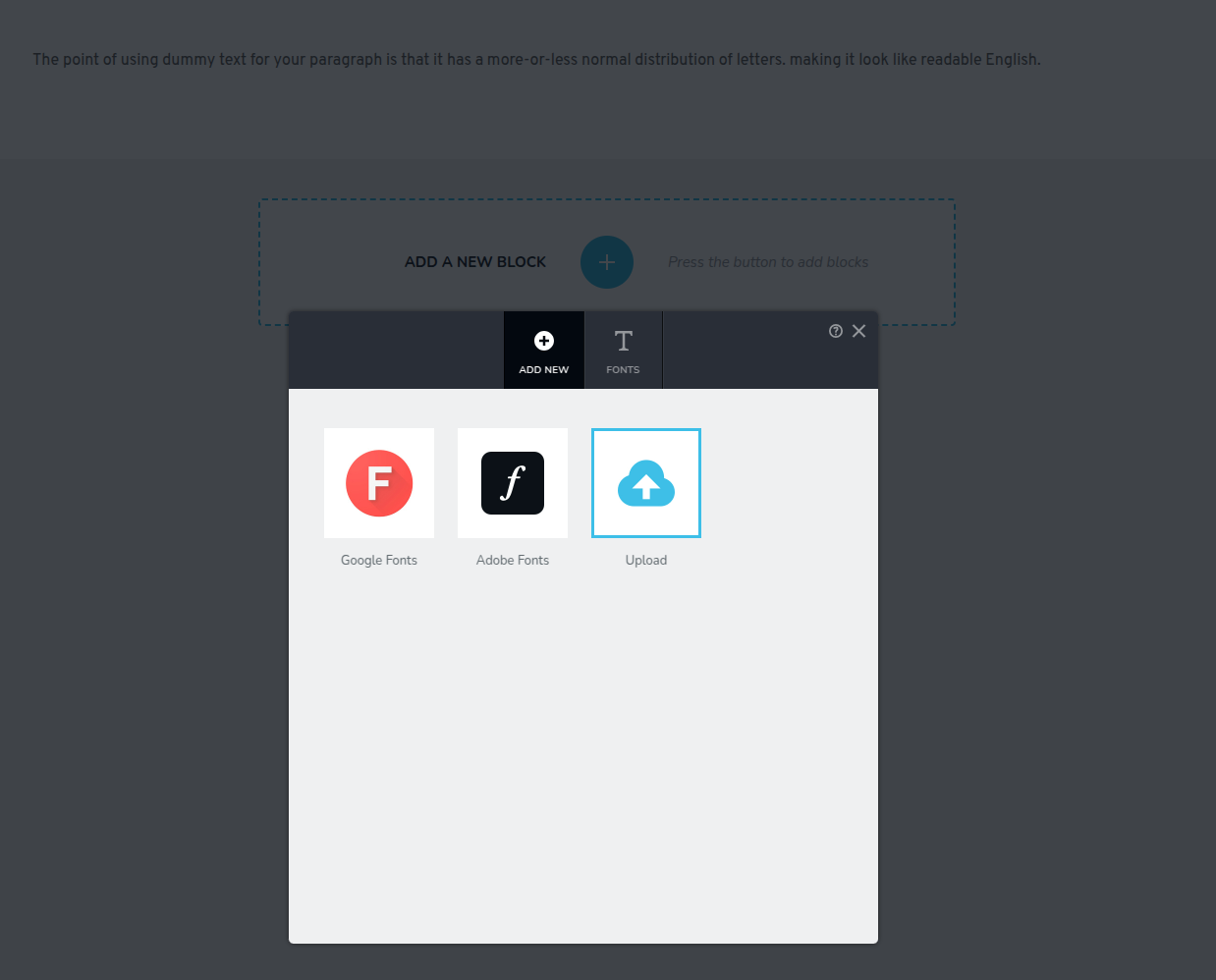Custom Fonts
Custom Fonts API Overview
The Custom Fonts API in the Brizy Editor allows developers to upload, manage, and delete custom fonts used in their projects. It supports full control over user-uploaded fonts—letting you define font names, weights, styles, and categories.
With this API, you can:
- Upload and register custom fonts in the editor.
- Update or overwrite existing custom font entries.
- Delete fonts no longer in use.
- Retrieve font metadata (name, weights, styles, category).
This feature is accessible in the editor via the “Add New Font” popup:

API Integration
To enable font management features in the Brizy Editor, you need to add a fonts integration to the config object
during editor initialization.
const config = {
// Other configuration properties
integrations: {
// Other integrations
fonts: {
upload: {
get: (res: Response<Array<UploadedFont>>, rej: Response<string>) => {
// Fetch all custom fonts uploaded by the user
// Call res(fonts) with the list or rej(error) on failure
res();
},
upload: (
res: Response<UploadFont>,
rej: Response<string>,
extra: {
name: string;
id: string;
files: FontFile;
}
) => {
// Upload a new custom font
// 'extra' contains the font's name, ID, and file(s)
// Call res(uploadedFont) on success or rej(error) on failure
res();
},
delete: (
res: Response<string>,
rej: Response<string>,
fontId: string
) => {
// Delete a custom font by ID
// Call res() on success or rej(error) on failure
res();
}
}
}
},
urls: {
// Other URLs
editorFonts: "https://example.com/fonts" // Base URL for custom font assets
}
};
Getting Fonts
The get method in the upload object retrieves the list of custom fonts available in the editor.
Call the res callback with an array of font objects. Each object should have:
id: Unique font identifier.family: Font family name.type: Alwaysuploaded.weights: Array of available font weights (e.g.,[400, 700]).deleted: (optional) Boolean indicating if the font is deleted.
Uploading Fonts
The upload method adds a new custom font.
Call the res callback with the uploaded font object, which should include:
id: Unique font identifier.family: Font family name.type: Alwaysuploaded.weights: Array of available font weights (e.g.,[400, 700]).
The extra parameter provides upload data:
name: Font name.id: Font ID.files: Font file structure:
export interface FontFile {
[weight: string]: {
[fileType: string]: File | null;
};
}
Example:
{
"400": {
"woff2": File,
"woff": File,
"ttf": File
},
"700": {
"woff2": File,
"woff": File,
"ttf": File
}
}
For more details about the CustomFont types, refer to the Custom Font types section.
Deleting Fonts
The delete method removes a custom font by ID. Call res() on success or rej(error) on failure. The fontId parameter is the ID of the font to delete.
Editor Fonts URL
The urls.editorFonts property defines the base URL for font resources. The builder will automatically construct the full URL for each font by appending the font ID to this base URL.
In Editor Mode, fonts are loaded individually using:
`${urls.editorFonts}${fontId}:${fontWeights}`
Example:
const baseEditorFonts = "https://example.com/fonts/";
const fontId = "12345";
const fontWeights = [400, 700];
const fontUrl = `${baseEditorFonts}${fontId}:${fontWeights.join(",")}`;
// Result: "https://example.com/fonts/12345:400,700"
In preview mode, all used fonts are loaded in one request:
`${urls.editorFonts}${font1Id}:${font1Weights}|${font2Id}:${font2Weights}|...`
Example:
const baseEditorFonts = "https://example.com/fonts/";
const font1Id = "12345";
const font1Weights = [400, 700];
const font2Id = "67890";
const font2Weights = [400, 500];
const fontUrl = `${baseEditorFonts}${font1Id}:${font1Weights.join(",")}|${font2Id}:${font2Weights.join(",")}`;
// Result: "https://example.com/fonts/12345:400,700|67890:400,500"
The content of the font file should be a CSS file that includes the @font-face rule for each font weight and style.
Note that the font face should be following the format:
For example if your url is https://example.com/fonts/12345:400,700, the content of the file should look like this:
@font-face {
font-family: '12345';
src: local('12345'), url('https://example.com/fonts/uploaded-12345font.ttf') format('truetype');
font-weight: 400;
font-style: normal;
}
@font-face {
font-family: '12345';
src: local('12345'), url('https://example.com/fonts/uploaded-12345font-bold.ttf') format('truetype');
font-weight: 700;
font-style: normal;
}
For the preview mode example, if your url is https://example.com/fonts/12345:400,700|67890:400,500, the content of the file should look like this:
@font-face {
font-family: '12345';
src: local('12345'), url('https://example.com/fonts/uploaded-12345font.ttf') format('truetype');
font-weight: 400;
font-style: normal;
}
@font-face {
font-family: '12345';
src: local('12345'), url('https://example.com/fonts/uploaded-12345font-bold.ttf') format('truetype');
font-weight: 700;
font-style: normal;
}
@font-face {
font-family: '67890';
src: local('67890'), url('https://example.com/fonts/uploaded-67890font.ttf') format('truetype');
font-weight: 400;
font-style: normal;
}
@font-face {
font-family: '67890';
src: local('67890'), url('https://example.com/fonts/uploaded-67890font-bold.ttf') format('truetype');
font-weight: 500;
font-style: normal;
}
The Brizy Editor supports the following font formats:
woff2woffttfeot
Basic Usage
The following example demonstrates how to integrate custom font support into the Brizy Editor using the Fonts API.
It includes fetching available fonts, uploading new fonts, and deleting existing ones.
const config = {
integrations: {
fonts: {
upload: {
get: (res, rej) => {
try {
// Fetch the list of available custom fonts
res([
{
id: "font1",
family: "Custom Font 1",
type: "uploaded",
weights: [400, 700],
},
{
id: "font2",
family: "Custom Font 2",
type: "uploaded",
weights: [400, 500],
}
]);
} catch (error) {
rej("Error fetching fonts");
}
},
upload: (res, rej, extra) => {
const { name, id, files } = extra;
// Process and store the uploaded font files
// Example assumes successful storage and returns the new font object
const uploadedFont = {
id,
family: name,
type: "uploaded",
weights: Object.keys(files).map(weight => parseInt(weight)),
};
res(uploadedFont);
},
delete: (res, rej, fontId) => {
try {
// Delete the font by ID from your storage/server
res(fontId);
} catch (error) {
rej("Error deleting font");
}
}
}
}
}
};